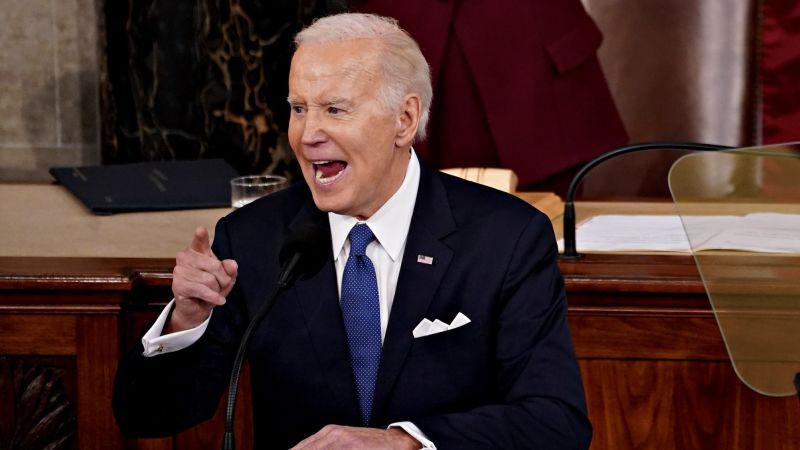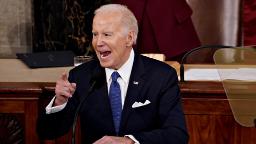

CNN
—
President Joe Biden starkly warned he will protect America against Chinese threats to its sovereignty and singled out President Xi Jinping – a striking escalation of a suspected spy balloon showdown during his State of the Union address.
Biden called out Beijing on Tuesday before millions of viewers in the US and around the world as diplomatic tensions with China soar and new details emerge of an expansive Chinese balloon surveillance program.
In the highly symbolic choreography of the US-Chinese relationship, Biden’s statements were unusually direct and raise questions about how Beijing will respond, even if his tone spoke to a charged domestic political context as Republicans complain he was too slow to shoot down the balloon.
Biden said in his speech in the House of Representatives that he had told Xi that Washington seeks “competition, not conflict.” But he also said that US investments in its alliances, military and advanced technologies meant that America was now in its strongest position in decades to compete with China and defend its interests.
“Make no mistake: as we made clear last week, if China threatens our sovereignty, we will act to protect our country. And we did,” Biden said, referring to the moment Saturday when a US jet fired a missile that burst the balloon off the US east coast, after it had spent days wafting across the continental US and Canada.
Biden’s comments were in a theatrical setting and were partly designed to create political cover. But a president warning China not to infringe US sovereignty was still a remarkable moment that underlined a grave geopolitical shift.
Moments later, in an ad-libbed addition to his speech, Biden specifically named Xi, as he slammed autocracies and argued for the superiority of democracies.
“Name me a world leader who’d change places with Xi Jinping. Name me one!” Biden said of his Chinese counterpart, whom he last met in Indonesia last year and has known for years. The president was almost shouting at the end of a sentence that could be seen as disdainful of China’s stunning economic emergence at a time when Xi’s aura has been damaged by mismanagement of Covid-19.
Biden’s speech mostly concentrated on domestic issues. But his address came at a moment of geopolitical turmoil, when the United States is simultaneously confronting another nuclear rival: Russia. He hailed the Western effort to counter President Vladimir Putin’s invasion of Ukraine and vowed to Kyiv’s ambassador, who was in the audience: “We are going to stand with you as long as it takes.”
There’s almost nothing that unifies Democrats and Republicans in Washington.
But Biden’s comments underscored how opposition to China, which has been crystalizing here for several years, has now become a rallying and unifying point in US politics. China has long mounted a broad intelligence campaign against the US, using satellites, cyber and traditional methods of collection. The US also has extensive intelligence operations targeting China. But the sight of a balloon tracking across the US, visible from the ground and on blanket television coverage, encapsulated a potential threat to US sovereignty from China as never before amid talk that a new Cold War may be dawning.
Biden’s frank comments also served as an important milestone in the increasingly tumultuous competition between the US and China. For much of the past 20 years, US policy had been designed to usher China into the global system as a competitor but not an adversary, including with its entry into the World Trade Organization. But China’s huge economic growth and increasingly diplomatic belligerence has many Americans now considering that approach a failure. The US shift to talking about establishing guardrails for the relationship and for the need to protect the Western-led rules-based international system is resented in China and seen as an attempt to check its rightful destiny as a world power.
Biden has built on former President Donald Trump’s hostile turn against Beijing, which was turbocharged by the outbreak of a global pandemic that originated in China, and has drawn up broad new laws and policies challenging China’s influence. In another sign of unified opposition to China, House Speaker Kevin McCarthy has convened a new bipartisan House committee dedicated to examining the perceived threat from the Chinese Communist Party.
And Trump, again illustrating a moment of escalation in domestic political hostility to Beijing, wasted no time in one-upping Biden after Tuesday’s speech in a way that signals that China bashing – often a feature of presidential elections – will be intense in the 2024 campaign. That could further inflame diplomatic tensions and fuel Beijing’s belief that the US is intent on containing its rise.
Trump’s campaign vowed to impose travel and visa sanctions to “shut off Chinese access” to US secrets and pledged new restrictions on Chinese ownership of US energy, technology, infrastructure, farmland, medical supplies and other assets. It was not immediately clear how Trump’s plans would differ from efforts already underway. And none of the tough new talk – from Biden and Trump – acknowledges the deep and intricate links between the US and Chinese economies that would make full decoupling a process that could cost both sides dearly. A direct military confrontation or full-scale war would be even more ruinous to the global economy.
One key question now is whether heated US and Chinese rhetoric – in many cases driven by domestic considerations – is a case of both sides going through the diplomatic motions after a moment of turbulence or whether it represents another new baseline in a deteriorating relationship similar to the fracture caused by former Democratic House Speaker Nancy Pelosi’s visit to Taiwan last year. It was notable that Biden didn’t specifically mention the democratic island – perhaps the most likely trigger of a US conflict with China – in his remarks, possibly to avoid causing even more tension.
Biden has repeatedly said as president that he would defend Taiwan in the event of a Chinese attack – in an apparent rewriting of the long-held policy of strategic ambiguity on the issue – only for officials to insist the US stance hasn’t changed.
The president spoke as an already volatile situation with China over the balloon got worse. The top Chinese official in Washington, Xu Xueyuan, had earlier lodged “stern representations” in demarches to senior State Department and national security officials, the Chinese embassy said in a statement, complaining that the US had used force to attack the balloon. National Security Council spokeswoman Adrienne Watson disdainfully responded by saying, “It was clear they are scrambling to do damage control, rather than credibly address their intrusion into our airspace.”
China initially expressed regret at what it claimed was a civilian airship that had crossed into US air space. But its response has hardened since the balloon was shot down. The Pentagon said earlier Tuesday that China had refused a request by US Secretary of Defense Lloyd Austin for a conversation with his counterparts in Beijing after it was shot down. What is unclear now is whether the Chinese stance will lead to months of severed communication between the rivals – a dangerous situation given the proximity of their forces and possibility of miscalculation in the South China Sea – or whether once the rhetorical grandstanding is over, they will reengage.
When he put off his planned trip to Beijing over the balloon showdown, Secretary of State Antony Blinken was careful to say he was “postponing,” not scrapping his travel altogether. But there is no sign yet that conditions have stabilized to a point at which a trip, which had been meant to address the kind of tensions the balloon issue exacerbated, can take place any time soon.
One danger is that the gathering hostility toward China in Washington, which many top leaders see as arising out of Xi’s increasingly nationalistic and abrasive foreign policy, will hamper a much-needed domestic debate about how to handle China policy. Currently, the irresistible political momentum is for politicians to one-up one another in showing they are tough on Beijing. But this anti-China fervor, seen on both sides of the aisle, is hardly conductive to easing tensions – as shown by the way Republicans immediately condemned Biden over his balloon response.
Suspicions toward Beijing will not have been helped by revelations about the scope of the Chinese balloon program on Tuesday. US intelligence officials believe an extensive surveillance program run by the Chinese military is based in the province of Hainan and has conducted at least two dozen missions over at least five continents in recent years. Roughly half a dozen of those flights have been within US airspace – although not necessarily over US territory, according to one official familiar with the intelligence.
The president delivered his speech at a tense moment, with the United States locked in simultaneous confrontations with China and Russia. Those two nuclear superpowers have tightened their relationship in a new age of great power politics that Biden sees as a fight between democracy and tyranny. Biden framed Russia’s invasion of Ukraine as “a test for the ages, a test for America, a test of the world” and an example of how America was working for more “freedom, more dignity, and more peace.”
His remarks on Russia immediately proceeded those on China, making it impossible to miss the symbolic synergy between his policy toward both nations as he laid out what might be seen as a Biden doctrine of standing with democracies against autocracies and increasing attempts by nations like Russia and China to apply their power outside their borders.
